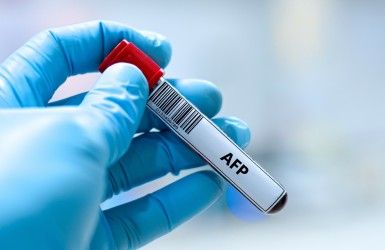General Health
Monitoring Pregnancy or Cancer Risk? An AFP Test Helps Detect Foetal or Tumour Abnormalities
6 min read
By Apollo 24|7, Published on - 30 May 2025
Share this article
0
0 like

When you're navigating pregnancy or trying to understand the risks related to cancer, tests and screenings can feel overwhelming. The AFP test often comes up, especially when doctors try to identify potential foetal abnormalities or certain types of tumours.
AFP (Alpha-Fetoprotein) is a protein made in the liver of an unborn baby (foetus). Small amounts of it can also be found in adults, and unusual levels in your blood might signal something that needs further attention.
Whether you're expecting a baby or monitoring health concerns, understanding what this test does, when it's needed and what the results might mean can make a difference.
What is an AFP Test?
Alpha-Fetoprotein (AFP) is a substance produced in large amounts by a foetus during pregnancy. In normal conditions, AFP levels are detectable in the amniotic fluid and the pregnant person's blood. In adults, this protein is usually present in very small amounts. If your doctor recommends an AFP test, it usually means they want to check whether these protein levels are within an expected range depending on your situation.
The test is typically done in two contexts. During pregnancy, it's a part of maternal screening and can help detect chances of certain congenital conditions. Outside of pregnancy, it is used to monitor for specific types of cancer or liver diseases in adults.
Why is the AFP Test Done?
If you’re pregnant, this test is usually offered between the 15th and 20th weeks. High or low levels of AFP in the mother's blood can indicate a higher risk of abnormalities like neural tube defects (such as spina bifida) or chromosomal conditions like Down syndrome. It’s important to note that this test does not diagnose these conditions, but it helps doctors decide if further investigation is needed.
For non-pregnant individuals, especially those under observation for cancer, the AFP test may be used as a tumour marker. Elevated AFP levels in adults may be linked to liver cancer, testicular cancer and certain ovarian cancers. It can also be used to track how a tumour responds to treatment or if it comes back after therapy. Occasionally, it’s used in patients with chronic liver conditions such as cirrhosis or hepatitis to assess cancer risk.
How is the AFP Test Performed?
It is a simple blood test and doesn’t require much preparation. For pregnant women, a small blood sample from a vein in the arm is taken. This sample is then sent to a lab where it is analysed for AFP levels. The procedure takes just a few minutes, and you can usually resume normal activities right after.
No special precautions are generally required, but your doctor may give you specific instructions based on your overall health or if other tests are being done at the same time. The results are measured in nanograms per millilitre (ng/mL), and depending on your age, health condition, and reason for testing, the interpretation can vary.
Have more questions?
Understanding AFP Test Results
Your doctor will evaluate the result in the context of your medical condition, stage of pregnancy (if applicable), and any symptoms or risk factors you might have. It’s important to know that an abnormal AFP level doesn’t automatically mean something is wrong. It just means further tests might be needed.
In pregnant women, high AFP levels can suggest neural tube defects in the foetus, such as spina bifida or anencephaly. Sometimes, it may also indicate incorrect dating of the pregnancy or even multiple pregnancies, like twins or triplets. On the other hand, low AFP levels can be associated with a higher chance of chromosomal conditions such as Down syndrome or Edwards syndrome.
In non-pregnant adults, an elevated AFP level might be linked to liver diseases or certain cancers. The test isn’t used to confirm cancer by itself but works more like a flag that tells doctors to investigate further with imaging or biopsy. In people already diagnosed with cancer, AFP levels can also help assess how well treatment is working.
Benefits of the AFP Test
For pregnant women, the test allows doctors to detect possible birth defects early in the pregnancy, giving families time to prepare emotionally, medically or both. When it comes to cancer monitoring, it offers a relatively affordable and accessible way to keep an eye on treatment progress or recurrence.
Another benefit is that the test is quick and usually doesn’t require any special preparation. The results are available in a short time, which helps fast-track further evaluations if needed.
When Should You Consider Getting an AFP Test?
The answer depends on your situation. If you are pregnant, especially between 15 to 20 weeks, your doctor may suggest an AFP test as part of routine prenatal screening. It is particularly recommended if you:
- Are over the age of 35
- Have a family history of birth defects
- Have diabetes
- Have had a previous pregnancy with a birth defect
Are carrying more than one baby
If you’re not pregnant, the AFP test could be suggested for other reasons. Your doctor may order it if there’s a suspicion of liver cancer or testicular or ovarian cancer. It may also be done if you already have a diagnosis and your doctor wants to monitor how your treatment is progressing. In some chronic liver diseases like hepatitis or cirrhosis, it’s used periodically to track your health status or screen for liver tumours.
How to Prepare for the AFP Test?
One of the reasons the AFP test is so commonly used is because it’s simple and doesn’t require complicated preparation. In most cases, there’s no need to fast or avoid certain foods before your appointment. You can eat and drink normally unless your doctor advises otherwise.
If you are pregnant, it’s helpful to make sure your healthcare provider has accurate information about how far along your pregnancy is. The interpretation of AFP levels depends a lot on the gestational age, so any error in dating can lead to confusing or misleading results. Your doctor may use an ultrasound to confirm your due date before or after the test to be certain.
For non-pregnant adults, especially if the AFP test is being done along with other liver function or cancer marker tests, you may be asked to avoid alcohol or certain medications before your blood sample is taken. But again, these are case-specific, and your doctor will guide you through it.
Conclusion
The AFP test helps doctors gather essential information about your health or your baby’s development. Whether you’re expecting and want to ensure everything’s progressing normally or monitoring a chronic condition like liver disease, this test offers a non-invasive way to spot early signs of trouble.
General Health
Frequently Asked Questions
Is the AFP test mandatory during pregnancy?
Is the AFP test mandatory during pregnancy?
What happens if my AFP test result is abnormal?
What happens if my AFP test result is abnormal?
Can lifestyle factors affect AFP levels?
Can lifestyle factors affect AFP levels?
How long do AFP test results take?
How long do AFP test results take?
Leave Comment
Recommended for you

General Health
Does a Sinus Infection Cause Cold-like Symptoms?
Most of us tend to associate a stuffy, runny nose with the common cold or allergy. However, a sinus infection may be the reason behind these symptoms.

General Health
Best First Aid Guidelines For Head Injuries
Knowing the basic steps of providing first aid for head injuries can be extremely helpful and lifesaving. Being aware of what to do and what not to do until professional medical help arrives, can significantly impact the chances of survival of the injured person.

General Health
8 Surprising Facts About HIV Everyone Should Know
Generating awareness is the only way to eliminate HIV myths and misconceptions about AIDS. This can help erase the stigma surrounding HIV and prevent the transmission of this virus, saving lives globally.
Subscribe
Sign up for our free Health Library Daily Newsletter
Get doctor-approved health tips, news, and more.
Visual Stories

The Best Exercises for Controlling Blood Sugar Levels
Tap to continue exploring
Recommended for you

General Health
Does a Sinus Infection Cause Cold-like Symptoms?
Most of us tend to associate a stuffy, runny nose with the common cold or allergy. However, a sinus infection may be the reason behind these symptoms.

General Health
Best First Aid Guidelines For Head Injuries
Knowing the basic steps of providing first aid for head injuries can be extremely helpful and lifesaving. Being aware of what to do and what not to do until professional medical help arrives, can significantly impact the chances of survival of the injured person.

General Health
8 Surprising Facts About HIV Everyone Should Know
Generating awareness is the only way to eliminate HIV myths and misconceptions about AIDS. This can help erase the stigma surrounding HIV and prevent the transmission of this virus, saving lives globally.